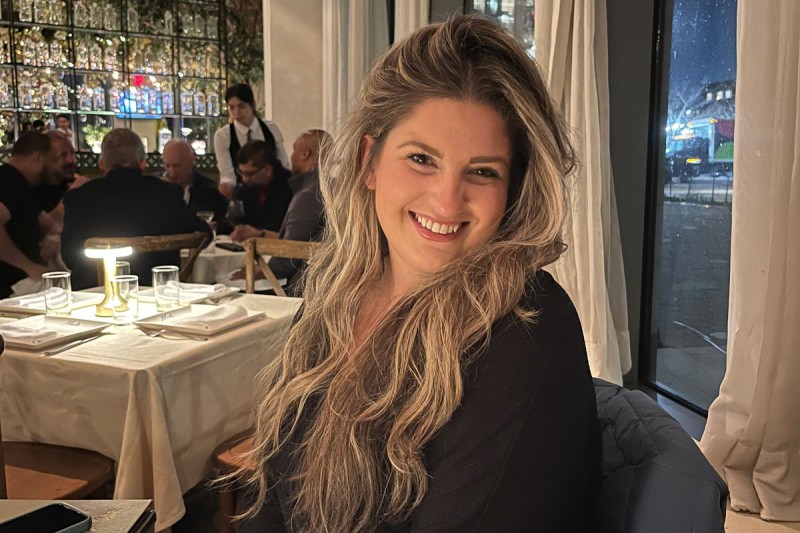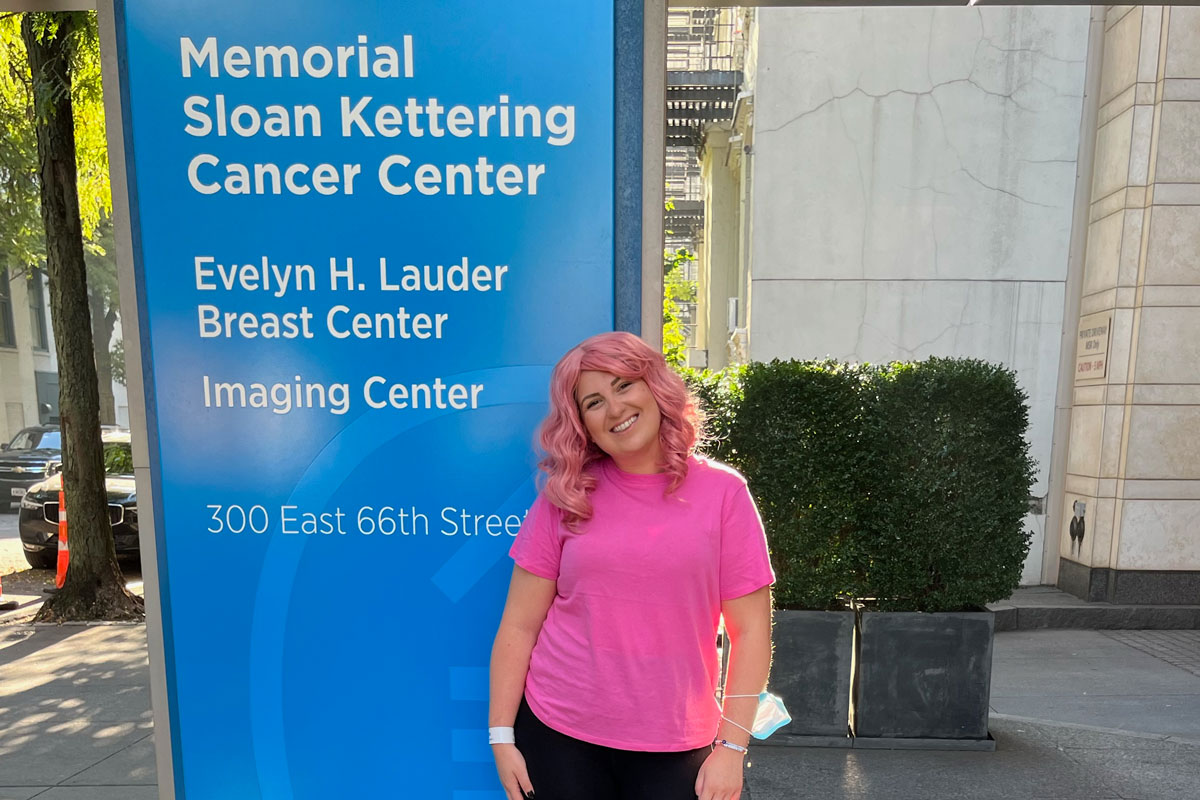
After being diagnosed with a BRCA1-associated breast cancer at age 28, Danielle Polumbo was grateful for the opportunity to participate in a research study aimed at her type of cancer.
In March 2023, Danielle Polumbo found a lump in her breast. “It shook me to my core,” the 28-year-old remembers. “I knew right away that this was not good.”
Just 18 months earlier, Danielle had learned that she carried a mutation in the BRCA1 gene, which greatly increases risk of developing breast cancer and a handful of other cancers. When that risk turned into reality, fortunately Danielle was able to participate in an innovative pilot study involving a handful of patients at Memorial Sloan Kettering Cancer Center (MSK). This new approach aims to treat breast cancers caused by mutations in BRCA1 and its sister gene, BRCA2.
Today, much to her astonishment, Danielle is cancer free. Her results are remarkable indeed, and researchers must continue testing this approach in more patients before it’s used widely.
Combining PARP Inhibitors With Immunotherapy To Treat Hereditary Breast Cancer
The study, led by breast oncologist Ayca Gucalp, MD, is investigating the potential benefit of giving patients the drug olaparib (Lynparza®) before surgery. This drug was approved in 2018 to treat advanced breast cancers caused by mutations in BRCA1 and BRCA2.
Olaparib belongs to a class of drugs called PARP inhibitors. They work by exploiting an Achilles’ heel of BRCA cancers: The cells are unable to repair their DNA when it is damaged, which can make it difficult for them to grow.
“These tumors are actually quite fragile because they cannot repair certain kinds of damage caused by chemotherapy,” says medical oncologist and clinical geneticist Mark Robson, MD, who is Chief of MSK’s Breast Medicine Service and co-investigator on the trial. PARP inhibitors are also used to treat ovarian cancer, prostate cancer, and pancreatic cancer caused by BRCA mutations.
In addition to olaparib, Danielle received pembrolizumab (Keytruda®), an immunotherapy drug that makes it easier for the immune system to fight cancer.
“There have been a bunch of studies looking at olaparib in combination with immunotherapy in people with metastatic disease, and the safety of this combination is well established,” Dr. Robson says. “Whether adding immunotherapy in this setting is more effective than giving a PARP inhibitor alone is something our research aims to establish.”
Drug Combination Has Fewer Side Effects Than Traditional Breast Cancer Chemotherapy
Danielle understood that the treatment was experimental and there was no guarantee it would work. But she was grateful to be able to avoid chemotherapy drugs with harsh side effects that otherwise would have been used to shrink her tumor before surgery. Because the tumor was large and because it was triple-negative breast cancer (a particularly aggressive form of the disease), she was told she would need 25 rounds of chemotherapy. Olaparib and pembrolizumab both have side effects, but they don’t cause hair loss, and they don’t cause the same levels of nausea and low blood counts associated with chemotherapy.
Three weeks after her first treatment with olaparib and pembrolizumab, Danielle had an appointment with Dr. Robson.
“I will never forget that day. He couldn’t feel the tumor,” she says. “Everything happened so fast. I barely had time to process that I had cancer, and it was already going away.”
The tumor eventually shrank from 3 centimeters (about the size of a grape) to 3 millimeters (about the size of a sesame seed). The three other patients treated in the study so far have also had very good responses to the drug combination.

Thanks to an experimental treatment, Danielle was able to greatly reduce the amount of chemotherapy needed to treat hereditary breast cancer.
After 12 weeks of treatment from Dr. Robson, breast surgeon Minna Lee, MD, performed a double mastectomy to remove any remaining cancer cells and protect Danielle from developing another breast cancer. Dr. Lee also removed lymph nodes from Danielle’s armpit. Plastic surgeon Michelle Coriddi, MD, then performed reconstructive surgery.
“Ten days post-surgery, I was officially declared cancer free,” Danielle says. “Dr. Lee was so amazing, and I still think about her every day. I am able to deal with all of this because she took the best care of me, and she had so much confidence in me.”
Danielle is undergoing four rounds of chemotherapy to make sure her cancer doesn’t come back — the last step in her treatment. Dr. Robson says because she responded so well to the treatments before her surgery, he was able to greatly decrease the amount of chemotherapy she would receive.
MSK Leads the Treatment of Hereditary Breast Cancers
MSK is a leader in caring for patients with inherited mutations in genes like BRCA1. After Danielle first learned she had the mutation, she enrolled in MSK’s RISE (Risk Assessment, Imaging, Surveillance, and Education) Program for people at increased risk of breast cancer, led by internist Debra Mangino, DO. Dr. Mangino screened Danielle for breast cancer twice a year, alternating between mammograms and MRIs. When Danielle first discovered the tumor in her breast, it had been less than six months since her previous scan.
MSK is also a leader in developing specialized treatments for subsets of people with breast cancer, including through its Hereditary Breast Cancer Treatment Program, which is co-led by Drs. Robson and Lee.
The study that Danielle participated in is one of several underway at MSK that is specifically focused on treating breast cancers caused by inherited mutations.
“The fact that we are able to offer these specialized treatments illustrates the importance of doing genetic testing,” Dr. Robson says. “Genetic testing is the best way for us to get a complete picture of what’s going on in the tumor.” Many more trials are planned for this group of patients with cancers caused by an inherited genetic mutation.
Until now, Danielle has not told many people about her diagnosis, but as her treatment reaches the end, she says she is ready to begin sharing her experiences. “I am so much more than this cancer,” she says. “But I am honored if my story can help others who are facing what I faced.”

